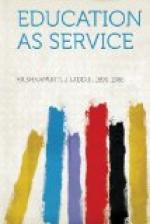Unless a teacher works in this spirit, he does not understand how sacred and solemn a trust is placed in his hands. No teacher is worthy of the name who does not realise that he serves God most truly and his country most faithfully when he lives and works with his boys. His self-sacrificing life, lived amongst them, inspires them to perform their duties well, as they see him performing his, and thus they grow in reverence and patriotism. These boys are God’s children entrusted to his care; they are the hope of the nation placed in his hands. How shall he answer to God and the nation, when the trust passes out of his hands, if he has not consecrated his whole time and thought to discharge it faithfully, but has allowed the boys to go out into the world with out love to God, and without the wish and power to serve their country?
Boys, as well as teachers, must learn self-control in action. They must not so engage in other activities as to neglect their ordinary school duties. My Master says to those who wish to serve Him: “You must do ordinary work better than others, not worse.” A boy’s first duty in school is to learn well, and nothing should lead him to neglect his regular school work. Outside this—as it is best that his activities should be kept within the school—the wise teacher will provide within the school organisation all the activities in which his boys can usefully take part. If there should be any national organisation to which he thinks it useful that they should belong, he will himself organise a branch of it within the school and he himself and the other teachers will take part in it. For example the Boy-Scout movement and the Sons of India are both national organisations, but branches of them should be formed in the separate schools. Teachers




